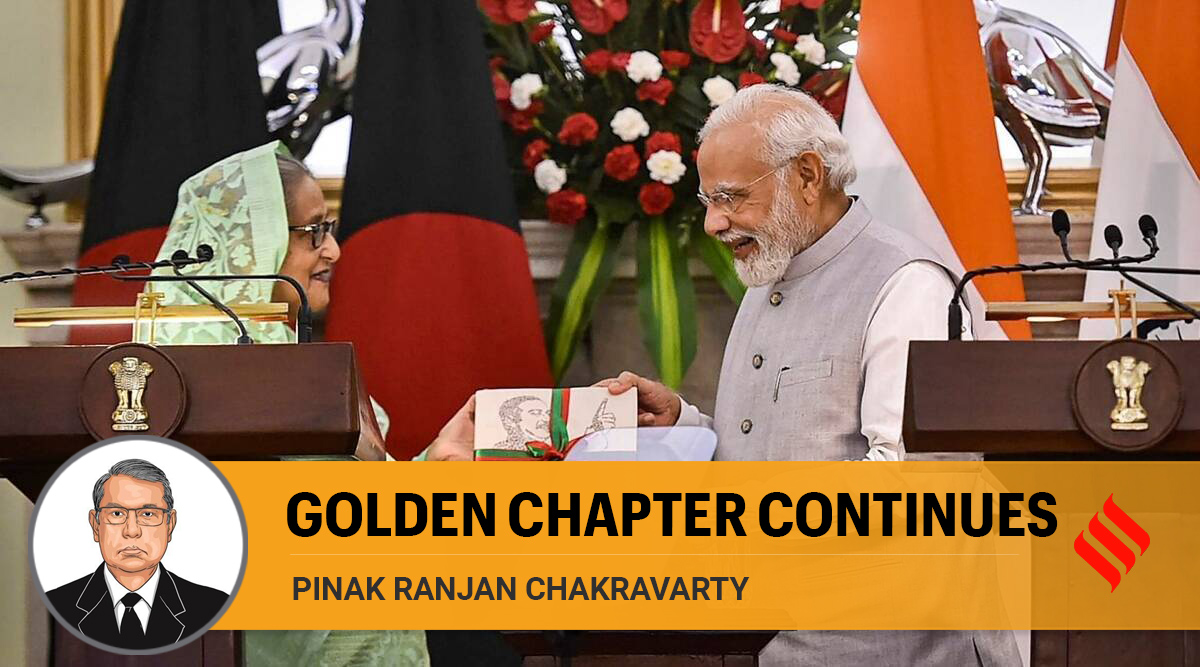 Pinak Ranjan Chakravarty writes: PM Hasina has strived to reinforce the secular nature of Bangladesh’s polity, in the teeth of opposition from Islamists and puritanical sections.
Pinak Ranjan Chakravarty writes: PM Hasina has strived to reinforce the secular nature of Bangladesh’s polity, in the teeth of opposition from Islamists and puritanical sections. The Joint Statement issued after Prime Minister Narendra Modi’s visit to Bangladesh in March 2021 noted that bilateral ties were enjoying a “Shonali Adhhaye” (golden chapter). The last decade or so has indeed been the best period in the relations between the two countries in the last 50 years. Bangladesh is now central to India’s “Neighbourhood First Policy”, particularly given the economic crisis affecting Pakistan and Sri Lanka. Bangladesh remains an oasis of political and economic stability, though stress factors generated by the Covid pandemic and the war in Ukraine have caused inflation linked to high energy prices.
Even with the friendliest of neighbours, there are always areas of disagreement. It is a sign of the mature leadership in both countries that these differences have not been allowed to upset the broad positive trend in the relationship. Bangladesh is India’s largest trading partner in the Subcontinent, the largest development partner, the most productive connectivity partner and the largest source of foreign tourists. The total trade turnover in 2021 touched $18 billion.
PM Shiekh Hasina’s visit follows former Rashtrapati Ram Nath Kovind’s and PM Modi’s visit to Bangladesh in 2021, for the celebration of 50 years of the country’s independence and “Mujib Borsho”. The upward trajectory in bilateral ties began in 2008, under the military-backed caretaker government. Maitri Express, the first passenger train between Dhaka and Kolkata, made its inaugural run in April 2008. Since 2009, PM Hasina has ensured that the momentum in ties was maintained by taking the bold decision to crack down on Indian insurgent groups operating from Bangladesh. This eliminated a long-term irritant in bilateral ties. Her visit to India in 2010 led to the signing of the Comprehensive Framework of Cooperation. This facilitated the grant of duty-free access to Bangladesh’s exports to India in 2011.
During the current visit, seven agreements have been concluded in sectors like connectivity, environment, water management, science and technology, railway, law, information and broadcasting among others. Five new infrastructure projects have been announced. Significantly, there is an agreement on the water-sharing formula for the river Kushyara that flows into Bangladesh from Assam’s Silchar district. India has requested the finalisation of the temporary water sharing accord on the Feni river, which meets Tripura’s water requirements. The pending Teesta agreement has been caught in the quagmire of Centre-state relations in India. The Joint Rivers Commission has been mandated to examine the sharing of waters of 54 transboundary rivers and flood data sharing. Bangladesh has announced 200 scholarships to descendants of children of Indian military personnel who laid down their lives in the 1971 War of Liberation. India has a programme of providing medical facilities for war veterans and their families. These measures cement people-to-people ties.
Negotiations on the Comprehensive Economic Partnership Agreement (CEPA) are to start shortly. Bangladesh will graduate from a Less Developed Country (LDC) to a developing country by 2026 and will no longer be entitled to trade and other benefits that are accorded to LDCs under international and regional trading agreements. The CEPA will help manage this transition and preserve the trade privileges that Bangladesh enjoys.
The rising energy demand in Bangladesh has led to the 1,320 MW thermal power plant being built at Rampal by the NTPC in a 50:50 joint venture. A 1,600 MW power plant in Godda, Jharkhand built by the Adani group will supply power to Bangladesh via a dedicated transmission line by December next year. The “Friendship” pipeline from Assam’s Numaligarh refinery is nearing completion and will deliver petroleum products to Parbatipur in Bangladesh
Around $8 billion Line of Credit (LoC) has been extended to Bangladesh, including $500 million for defence-related procurement. This is significant because Bangladesh’s defence forces have been heavily dependent on Chinese military hardware. Progress on this issue will ensure that the country diversifies its defence hardware inventory. China’s footprint in Bangladesh has increased via the BRI, as part of Beijing’s concerted effort to influence New Delhi’s neighbours. Bangladesh has been careful in assessing China’s “debt-trap” diplomacy, given the economic crises in Pakistan and Sri Lanka.
The Rohingya refugee issue has imposed a huge burden on Bangladesh. PM Hasina raised this issue and called on India to help in repatriating the refugees to Myanmar. India has done so with humanitarian assistance and quiet dialogue with the military government in Naypyidaw. Only international pressure can help but China is unlikely to push Naypyidaw to resolve the issue.
PM Hasina has strived to reinforce the secular nature of Bangladesh’s polity, in the teeth of opposition from Islamists and puritanical sections. With her overwhelming majority in parliament, she has restored secularism as a founding principle of the country’s constitution but has avoided expunging the provision which makes Islam the state religion. She does not want to allow her opponents to hurl allegations of being anti-Islam. She ensured that war criminals were convicted and executed. This dampened the morale of the Islamists, particularly the pro-Pakistani Jamaat-e-Islami.
Hardline Islamists will remain a source of danger and instability in Bangladesh. Their networks have links to Pakistan’s terrorist organisations and terrorist elements in India. They seek to destabilise Bangladesh and India. One tool of these anti-India groups is to harass and attack Hindus and force them to migrate. Better intelligence cooperation has helped both sides to tackle these disruptive elements. While bilateral ties will continue to grow, these inimical forces will seek to undermine goodwill. Both countries must cooperate more closely against this menace if the future has to be secured for economic growth and prosperity.
The writer is a former High Commissioner to Bangladesh, founder-Director of DeepStrat and Visiting Fellow at ORF, Delhi